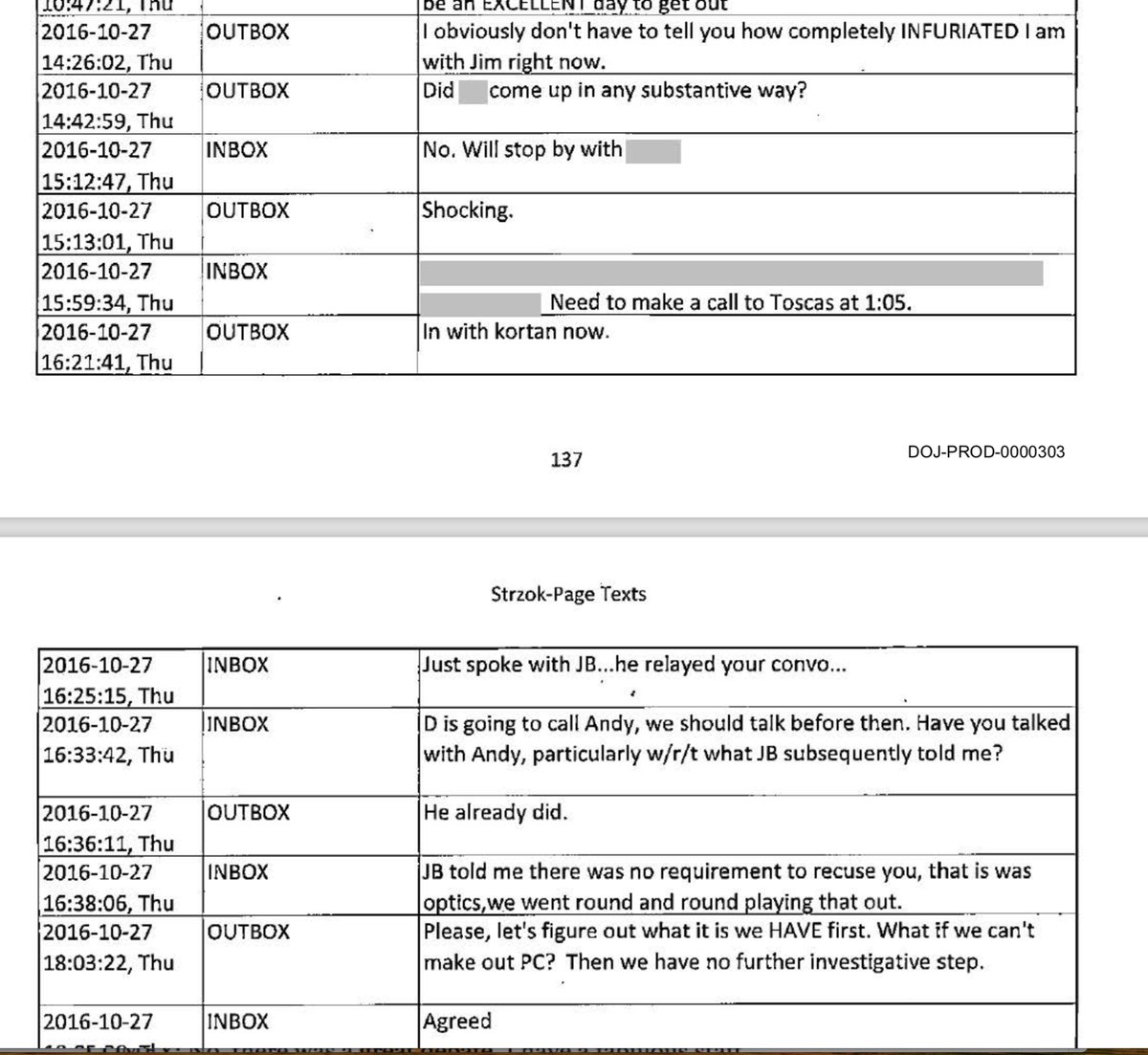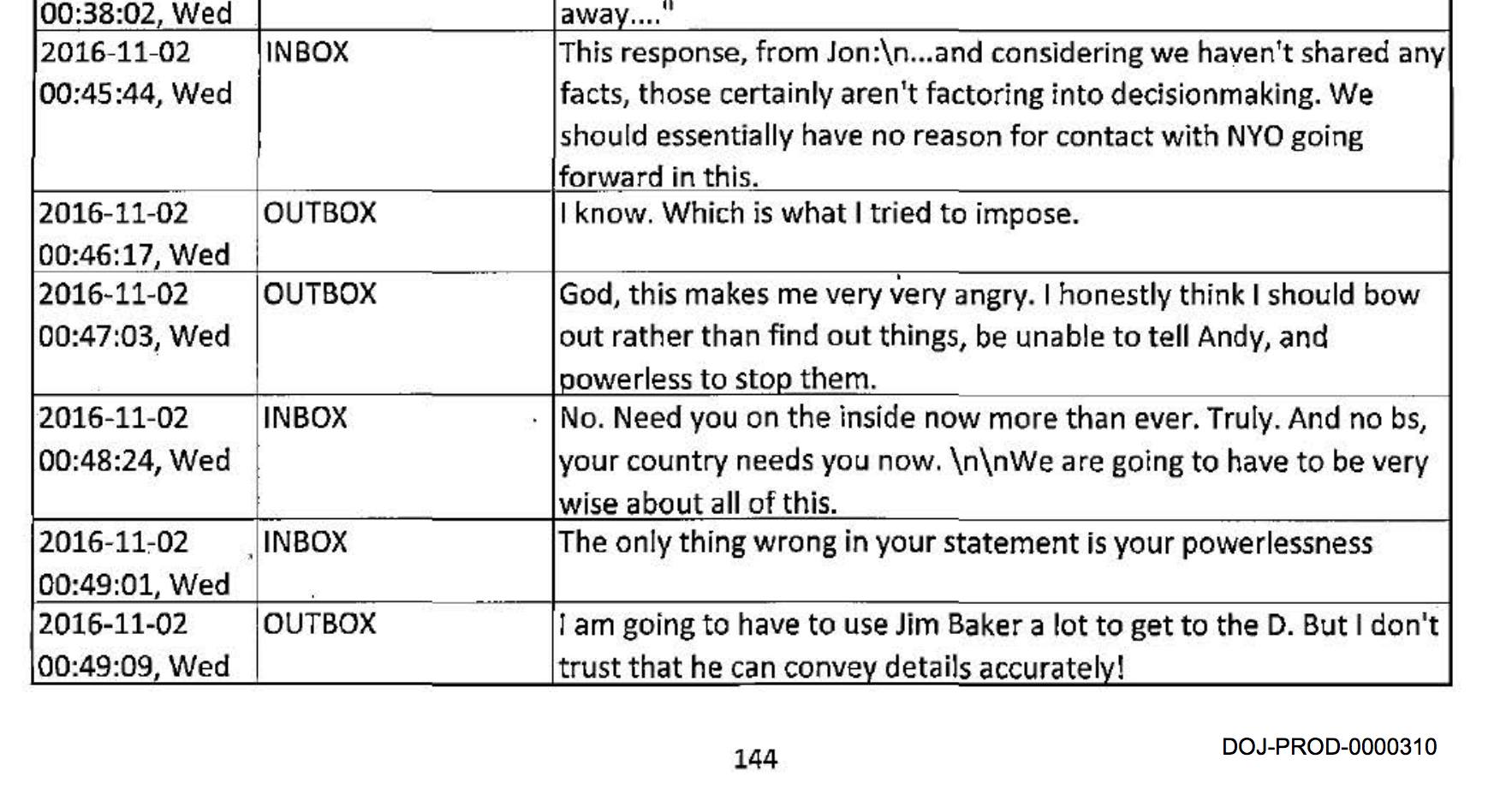February 22, 2018
Via Fax & U.S. Mail (202-514-4001)
U.S. Department of Justice
Office of the Inspector General
Attn: Inspector General Michael Horowitz
950 Pennsylvania Avenue, N.W.
Suite 4706
Washington, D.C. 20530-0001
Re: FBI handling of Clinton e-mail investigation
Dear Inspector General Horowitz:
I have written to you twice previously (on January 24, 2017 and September 18, 2017) to express my concerns regarding your pending investigation of the FBI’s handling of the Clinton e-mail investigation. I continue to hope that your report will shed much-needed light on what transpired. Although I succeeded in obtaining a redacted version of the Clinton search warrant in December 2016, my FOIA requests for an unredacted copy of the warrant application and other materials related to the decision to seek that warrant have been unsuccessful so far. As a result, I will soon be filing suit against the FBI to obtain some of these materials. If your report can also manage to release the underlying documents, I would very much appreciate that.
In the past weeks, the release of the Sztrok-Page text messages and Lanny Davis’ new book, have added more details to several issues that I trust are critical to your report. As someone who has been carefully following this matter, I want to share with you some of my thoughts in the hopes that your report will be able to answer some of the outstanding questions that remain.
Mr. Davis’ book includes a good deal of material on the beginnings of the Clinton e-mail investigation, but cannot answer the fundamental question of why the FBI converted a non-criminal referral over the classification of documents into a criminal investigation. As I have previously written, the principal statute at issue (e.g. 18 U.S.C. §793(e) and (f)) does not make the sending and receiving of e-mails from a private server to authorized personnel a crime. While the public, various politicians and also Director Comey in his July 5, 2016 statement, refer to “mishandling” classified information, the vague term “mishandle” does not appear in the statute. The law concerns “removal,” and sending or receiving an e-mail is not “removal.” Nor has there ever been any indication that any information was “delivered to anyone in violation of his trust.” I suppose I am not the first person to make a close analysis of the statute, and so I hope that you can shed light on the FBI’s decision by releasing any legal analysis that was done by the FBI or Department of Justice on this interpretation of the statutes in question. I would be very surprised if no one properly analyzed the statue, but if that is the case, then I hope that your report will include a discussion of this issue.
The text messages between Peter Sztrok and Lisa Page are fascinating and provide a small window into the work done on the e-mail investigation. Although many right-wing critics have focused on various different aspects of their messages, I have not seen anyone really discuss the messages that pertain to the issues at stake in your investigation.
As I have written previously, it is obvious to any objective observer that there was never probable cause to search the Weiner laptop for Clinton’s e-mails. Sztrok and Page both must have recognized this fact and I hope you have interviewed them on this crucial question. See for example Sztrok’s text on September 10, 2016 at 12:55:59 explaining why some laptops and media turned over were not reviewed during the Clinton e-mail investigation “They would not consent and we did not have probable cause to get on them.” See also Page’s text on October 27, 2016 (the day Director Comey decided to pursue the Weiner laptop review and write to Congress) “Please, let’s figure out what it is we HAVE first. What if we can’t make out PC? Then we have no further investigative step.” So, who decided after October 27 that there was probable cause to search the Weiner laptop? When and how was this decision made? Was it before or after Director Comey sent his letter to Congress on October 28? The search warrant application was filed on Sunday October 30. Who was involved in preparing the warrant application? Was everyone in agreement or was there dissent on this issue? Did the FBI handle it properly, or was politics or “optics” the main concern? I hope that these crucial decisions will be a focus of your report.
Further questions include:
What was Lisa Page referring to when she wrote on October 26, 2016 at 22:03:00 “Call you from the car to talk about Chaffetz and current issue”? Was Rep. Jason Chaffetz perhaps already aware that there were Clinton e-mails found on the Weiner laptop? Why was Lisa Page concerned about Rep. Chaffetz?
When Director Comey testified on May 3, 2017 that there was a “junior lawyer” who asked whether he should consider the effects of his decision on the election, was that lawyer he referred to Lisa Page, or someone else?
Why did Lisa Page write that she was “completely INFURIATED” with Jim Baker on October 27, 2016 at 14:26:02?
What did Peter Sztrok mean when he wrote: “JB told me there was no requirement to recuse you, that is [sic] was optics, we went round and round playing that out”?
What is Peter Sztrok referring to when he wrote on November 1, 2016 at 23:05:28 “Figured out why they legally can’t do what you just said. We are comparing against material (to determine what is new) that we obtained during the investigation”? I previously pointed out to you that it should have been quite simple to review the e-mails on the Weiner laptop to determine that there was nothing remotely new or incriminating. Was there some issue that slowed down the review? So far, the FBI has pretended that the review was time-consuming and Director Comey testified that the staff “moved heaven and earth” to get it done. I doubt that his characterization is correct and hope that your report will shed light on this aspect of the debacle. Please remember, they were searching for something that never existed, and that they had no indication existed. Thus, the question is how long it should have taken for the FBI to realize its mistake.
What are Peter Sztrok and Lisa Page referring to when in the exchange beginning on November 2, 2016 at 00:45:44? Sztrok: “This response, from Jon:\n…and considering we haven’t shared any facts, those certainly aren’t factoring into decisionmaking. We should essentially have no reason for contact with NYO going forward in this.” Page: “I know. Which is what I tried to impose. God, this makes me very very angry. I honestly think I should bow out rather than find out things, be unable to tell Andy, and powerless to stop them.” Sztrok: “No. Need you on the inside now more than ever. Truly. And no bs, your country needs you now. \n\n We are going to have to be very wise about all of this. The only thing wrong in your statement is your powerlessness.” Page: “I am going to have to use Jim Baker a lot to get to the D. But I don’t trust that he can convey the details accurately.” This exchange raises a lot of concerns, the problem with the New York Office, finding things out (what things?) and not being able to do anything about them, not trusting Jim Baker to be able to convey details correctly to Director Comey. There seems to be something very wrong going on at this time.
I continue to hope that your report will provide much-needed clarity and transparency concerning perhaps the most critical decisions ever made by the FBI. My personal view is that serious mistakes were made, and I am dismayed that Director Comey, who must be aware of them, has not conceded any of them. The country needs to know what really went on, what mistakes were made, and why, so that we can hope to prevent such mistakes from happening in the future. We cannot allow the FBI to interfere with our elections by pursuing unwarranted investigations of political candidates.
Very truly yours,
RANDOL SCHOENBERG
P.S. For more details, please see my blogs at https://schoenblog.com/?p=1428, https://schoenblog.com/?p=1390, https://schoenblog.com/?p=1302, https://schoenblog.com/?p=1264, https://schoenblog.com/?p=1237, https://schoenblog.com/?p=1064 and https://schoenblog.com/?p=1008





